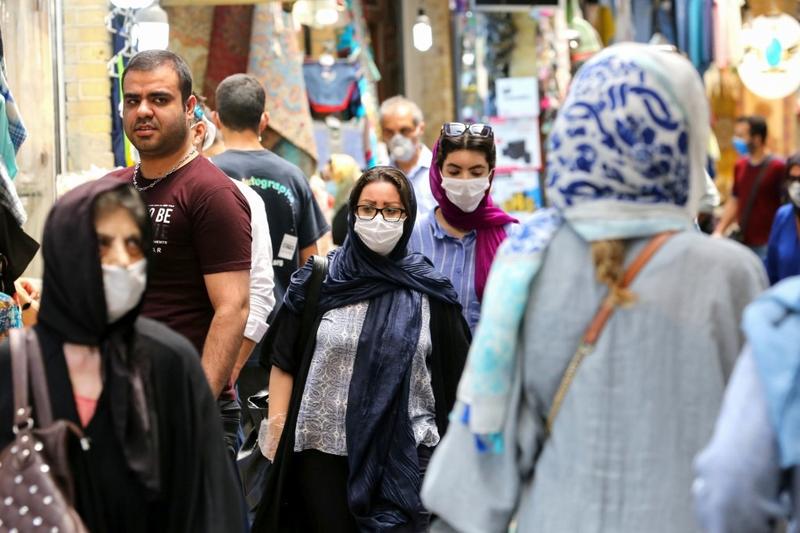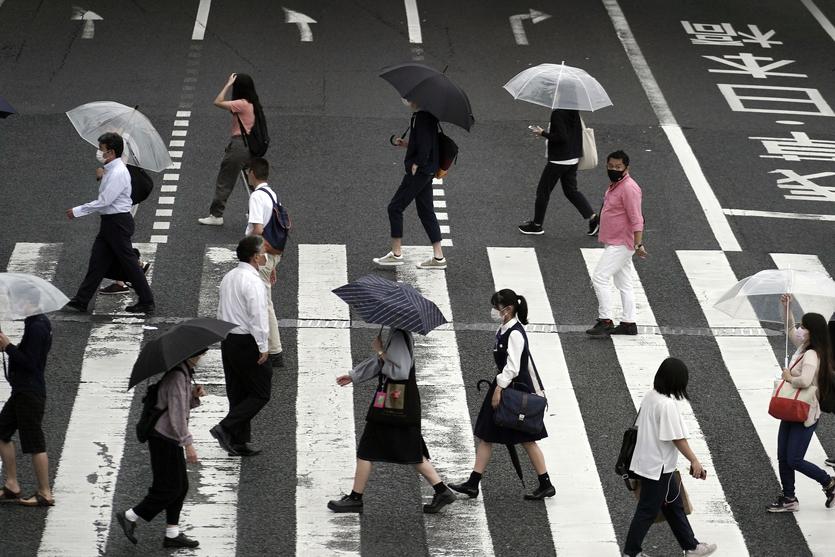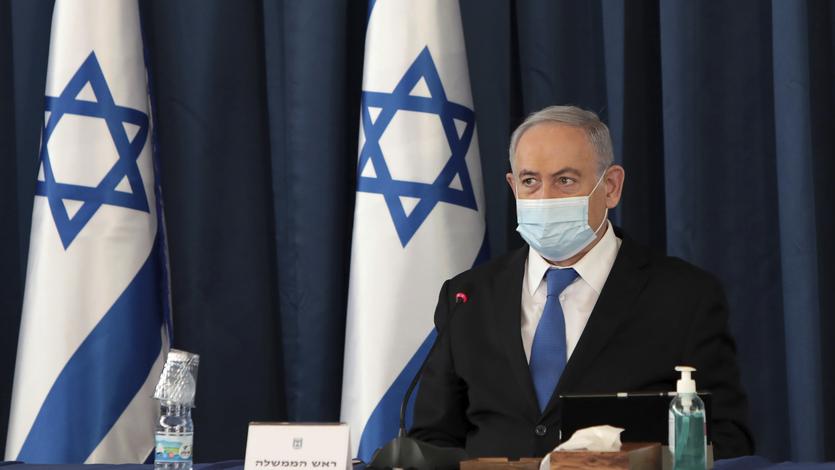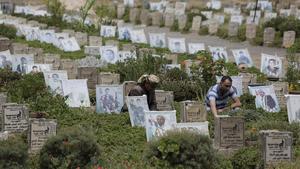 Iranians, some wearing protective gear amid the COVID-19 pandemic, shop at the Tajrish Bazaar market in the capital Tehran on July 14, 2020. (ATTA KENARE / AFP)
Iranians, some wearing protective gear amid the COVID-19 pandemic, shop at the Tajrish Bazaar market in the capital Tehran on July 14, 2020. (ATTA KENARE / AFP)
JERUSALEM / MANILA / SYDNEY / TOKYO / JAKARTA / SEOUL / DHAKA / BISHKEK / NEW DELHI / ULAN BATOR / WELLINGTON - Hospitals in Iran face acute shortages of medical personnel and beds as the country tackles a powerful second wave of the COVID-19 pandemic, a senior official of Tehran’s anti-coronavirus task force said on Thursday.
Iran, the Middle East country hardest hit by the pandemic, began relaxing its lockdown in mid-April.
But a second wave of infections emerged in early June and has proven much more serious than the first one, said Reza Jalili-Khoshnood, who is himself infected, the semi-official ISNA news agency reported.
Iran's COVID-19 cases rose to 267,061 on Thursday after 2,500 new infections were registered over the past 24 hours, state TV reported.
The total fatalities over the novel coronavirus in Iran hit 13,608 after 198 more deaths were added overnight, Sima Sadat Lari, spokeswoman for Iran's Ministry of Health and Medical Education, said during her daily update.
Indonesia
Indonesia plans to fine violators of social distancing rules under a new law as President Joko Widodo steps up efforts to contain the biggest outbreak of coronavirus in Southeast Asia.
Provincial chiefs will determine the types of punishment for offenders, taking into account local traditions, Widodo told a meeting of governors in Jakarta Wednesday. Earlier this week, the president told a cabinet meeting that people not wearing masks in public and those failing to maintain physical distance may be ordered to pay a fine or do social service.
Jokowi, as the president is known, has pointed to reluctance among Indonesians to wear masks as a key reason for the spread of the virus that’s claimed almost 3,800 lives and infected 80,094 people, the most among Southeast Asian nations. New cases have surged in recent weeks following easing of mobility restrictions including in capital Jakarta and Surabaya, the second-largest city, as the government seeks to minimize the hit to businesses and stem job losses.
Indonesia reported 1,574 new coronavirus cases on Thursday, bringing the total number of infections to 81,668 its health ministry said.
Indonesia also reported 76 new coronavirus deaths, taking the overall death toll to 3,873, ministry official Achmad Yurianto told a televised news briefing.
 People wearing face masks to help curb the spread of the new coronavirus walks Wednesday, July 15, 2020, in Tokyo. (EUGENE HOSHIKO / AP)
People wearing face masks to help curb the spread of the new coronavirus walks Wednesday, July 15, 2020, in Tokyo. (EUGENE HOSHIKO / AP)
Japan
A multi-billion dollar Japanese campaign to boost domestic tourism faced scrutiny on Thursday with the economy minister due to meet experts as critics worried that encouraging people to travel out of Tokyo risks spreading the coronavirus.
The concerns in Japan highlight a conundrum facing countries around the world over how to balance reviving economies battered by the coronavirus while safeguarding public health.
The Tokyo metropolitan government on Thursday confirmed a record 286 new infections in the capital, with the latest figure surpassing the previous daily record of 243 cases recorded last Friday.
Tokyo Governor Yuriko Koike said earlier Thursday the figure would likely top the 280-mark, with the new record of COVID-19 cases being a result of increased testing.
The government’s top spokesman, Chief Cabinet Secretary Yoshihide Suga, highlighted the devastating economic impact of the coronavirus on Japan’s regions with no foreign tourists because of a travel ban to keep the virus at bay.
Scheduled to kick off July 22, the campaign will see travellers get subsidies of as much as 50 percent to boost tourism-reliant economies outside major population areas.
Australia
The Australian government is injecting a further A$1.5 billion (US$1.1 billion) into a wage subsidy programme to counter rising unemployment as the country posted the biggest rise in coronavirus cases since early April.
Australian officials reported 327 new COVID-19 cases on Thursday, a surge that was almost entirely due to the state of Victoria, which posted its biggest ever one-day rise in infections.
Victoria, Australia’s second-most populous state, has been isolated from the rest of the country for more than a week following a fresh outbreak of the disease. The 4.9 million residents in its capital, Melbourne, have been ordered to stay home except for essential business.
Australia has recorded nearly 11,000 cases of COVID-19, including 113 deaths. That remains well below many other countries, but a spike in the number of cases in recent days has worried officials.
The economy has taken a substantial hit and is headed for the country’s first recession in almost three decades. A further shutdown in Victoria would tighten the screws further.
The government on Thursday announced it would spend A$1.5 billion (US$1.1 billion) to substantially extend a program to subsidise the wages of apprentices. The funds will more than double the number of apprentice workers covered, to around 180,000 across all industries and to run until March next year, instead of September as originally planned.
That decision gives the first indication of how Prime Minister Scott Morrison plans to prop up the economy beyond September when a broader A$60 billion wage subsidy package is still due to expire.
Australia’s second-most populous state of Victoria said on Thursday two men in their 80s died overnight from the coronavirus, as the state logged a record daily rise in new infections.
Victoria reported 317 new daily cases, the highest since the pandemic began. The state’s previous high of 288 new cases came last week.
ALSO READ: Australia restricts number of citizens returning as virus surges
Bangladesh
Bangladesh registered 39 deaths from COVID-19 on Thursday, bringing the country's death toll to around 2,500.
Senior Health Ministry official Nasima Sultana said in a briefing that "2,733 new COVID-19 positive cases and 39 deaths were reported in the last 24 hours across Bangladesh."
"The number of confirmed infections in the country totaled 196,323, while fatalities stood at 2,496," she said, adding that the COVID-19 fatality rate in Bangladesh is now 1.27 percent.
According to the official, 12,889 samples were tested in the last 24 hours in labs across the country. She said the total number of recovered patients in the country stood at 106,963, including 1,940 on Thursday.
 In this July 5, 2020 file photo, Israeli Prime Minister Benjamin Netanyahu wears a face mask to help prevent the spread of the coronavirus as he opens the weekly cabinet meeting, at the foreign ministry, in Jerusalem. (GALI TIBBON / POOL VIA AP)
In this July 5, 2020 file photo, Israeli Prime Minister Benjamin Netanyahu wears a face mask to help prevent the spread of the coronavirus as he opens the weekly cabinet meeting, at the foreign ministry, in Jerusalem. (GALI TIBBON / POOL VIA AP)
Israel
Prime Minister Benjamin Netanyahu got a lukewarm reception on Thursday from his main coalition partner and the head of the central bank to a plan to grant money to all Israelis to kickstart the economy during the coronavirus crisis.
Netanyahu announced the 6 billion shekel (US$1.75 billion)package on Wednesday, amid public anger over his handling of a pandemic in which contagion has surged and promised state aid to businesses has been slow to arrive.
The payments of 750 shekels for individuals and up to 3,000 shekels to families, Netanyahu said, would boost consumer spending and employment. The plan still requires cabinet approval.
Bank of Israel Governor Amir Yaron and Foreign Minister Gabi Ashkenazi of the centrist Blue and White party that has partnered with Netanyahu’s Likud in the government, said the money should instead be targeted at the poorest citizens.
Top Israeli ministers decided to impose a full lockdown for weekends, according to a Channel 12 report.
The plan is to shut malls and beaches, and restaurants will only be allowed to serve takeout food, the report said, adding the restrictions would be in place from Friday to Sunday mornings. Some schools would also be closed should the government pass these measures, according to the report.
Israel, with a population of nine million, has reported 44,188 coronavirus cases and 375 deaths.
India
India's federal health ministry Thursday morning recorded 606 new deaths and 32,695 more COVID-19 cases during the past 24 hours, taking the death toll to 24,915 and total cases to 968,876.
This is said to be the highest single day spike in the number of fresh cases in the country so far.
 Yemeni men offer prayers at the grave of their relative who was killed during Yemen's ongoing conflict, at a cemetery in Sanaa, Yemen, July 3, 2020. (HANI MOHAMMED / AP)
Yemeni men offer prayers at the grave of their relative who was killed during Yemen's ongoing conflict, at a cemetery in Sanaa, Yemen, July 3, 2020. (HANI MOHAMMED / AP)
Yemen
The total number of COVID-19 cases in Yemen's government-controlled provinces increased to 1,526 on Wednesday, after 10 new cases were confirmed.
The Yemeni government also announced that the death toll from the disease climbed to 433 in different areas under its control, including the southern port city Aden.
Iraq
Iraqi Health Ministry on Wednesday recorded 2,110 new COVID-19 cases, bringing the total number of infections nationwide to 83,867.
The ministry reported 87 more deaths, raising the death toll from the infectious virus to 3,432.
Kuwait
Kuwait on Thursday reported 791 new COVID-19 cases and three more deaths, raising the tally of infections to 57,668 and the death toll to 402, the Health Ministry said in a statement.
Currently, 9,721 patients are receiving treatment, including 142 in ICU, the statement added.
Kyrgyzstan
Kyrgyzstan on Thursday reported 521 new COVID-19 cases and seven more deaths, raising the total number of infections to 12,498 and the death toll to 167.
Head of the public health care department of the country's Health Ministry Ainura Akmatova at a regular news briefing said that among the new cases 96 are medical workers, raising the tally of contracted medical workers to 2,076, including 583 recoveries.
Jordan
Jordan said on Thursday it will partially resume commercial flights from August to a limited number of European and Asian countries on an internationally approved safe list.
Government spokesman Amjad Adailah told state-owned Al Mamlaka TV that regular commercial flights from Alia international airport, suspended since March, could begin in the first or second week of August.
Passengers from the safe country list that includes Austria, Switzerland, Germany, Italy, Greece, Hong Kong and Thailand would be allowed into Jordan and the list could extend depending on the state of the pandemic, he added.
The country has recorded 1,201 cases with ten deaths.
Lebanon
Lebanon's number of COVID-19 infections increased on Wednesday by 91 to 2,542, while the death toll went up by one to 38.
The Lebanese Red Cross announced on Wednesday that 21 of its volunteers got infected with COVID-19, prompting it to conduct PCR tests for all its staff for a better assessment of the virus' spread.
Malaysia
Malaysia reported three new COVID-19 infections, bringing the national total to 8,737, the Health Ministry said on Thursday.
Health Ministry Director-General Noor Hisham Abdullah told a press briefing that one case is imported and the remaining two are local transmissions.
Meanwhile, the Langkawi International Maritime and Aerospace Exhibition (LIMA) scheduled from March next year, has been cancelled over concerns related to the outbreak, the Defense Ministry said in a statement.
Mongolia
Mongolia reported no new cases of COVID-19 in the last 24 hours, with the national tally remaining at 261, according to the country's National Center for Communicable Disease (NCCD) on Thursday.
Meanwhile, two more patients have recovered from the disease, taking the total recoveries to 209, the NCCD's head Dulmaa Nyamkhuu said at a daily news conference.
New Zealand
New Zealand reported one new case of COVID-19 on Thursday, with the number of active cases in the country remaining at 27, according to the Ministry of Health.
It has been 76 days since the last case of COVID-19 was acquired locally from an unknown source, said in a ministry statement.
Thursday's case was the child of two people previously reported as having COVID-19, who arrived in New Zealand from Italy on July 4. The family is in quarantine at the Commodore Hotel in Christchurch, it said.

People wearing face masks as a precaution against the new coronavirus visit a beach in Bali, Indonesia on July 15, 2020. (FIRDIA LISNAWATI / AP)
Oman
Oman's Ministry of Health announced 1,679 new COVID-19 cases, taking the tally of infections to 61,247.
The death toll in Oman climbed to 281 while recoveries rose to 39,038.
Palestine
Palestine on Wednesday reported 419 new cases of COVID-19 in the Palestinian territories in the past 24 hours.
During a meeting in the West Bank city of Nablus, Palestinian Health Minister Mai al-Kaila said Palestine is witnessing a worrying spread of the virus that needs different preparations.
Qatar
Qatar's health ministry announced 450 new infections of COVID-19, increasing the total number of confirmed cases in the Gulf state to 104,983.
Meanwhile, 477 people recovered from the virus, bringing the total number of recoveries to 101,637, while one died, raising the fatalities to 151, said the ministry.
South Korea
South Korea needs to train for potential infectious disease outbreaks worse than COVID-19 and detailed treatment guidelines, as risks of more frequent such outbreaks rise and public sickbeds remain tight, a senior government official said.
South Korea’s early success to tame the novel coronavirus through aggressive contact tracing and testing has been touted by disease experts worldwide as gold standard of how to effectively control infectious disease.
Its early state intervention limited widespread community infections and helped hospitals keep sickbeds available for severely affected patients.
But its extremely low rate of public hospital beds - only 10% of total - remains a potential weak spot, as the country continues to battle small but persistent outbreaks and front-line public healthcare workers suffer burnout after more than six months of treating COVID-19 patients.
South Korea had the second highest number of hospital beds, next to Japan, in 2017 with 12.3 beds per 1,000 population, double the Organisation for Economic Cooperation and Development’s (OECD) average of 4.7, according to an OECD report.
South Korea’s national healthcare insurance, which covers the entire 50 million population, has so far spent 132 billion won (US$109 million) treating COVID-19 patients and the amount is likely to rise above 200 billion won this year, according to NHIS.
That’s equivalent to US$3,600 for a mild patient and US$10,000 for a serious one, who can cost up to US$58,000 to treat.
The country has reported a total of 13,551 confirmed cases and 289 deaths, sharply lower than most countries.
Saudi Arabia
Saudi Arabia reported 2,671 new COVID-19 cases, raising the tally of infections in the kingdom to 240,474.
The coronavirus death toll climbed to 2,325 after 42 more fatalities were added, while the tally of recoveries rose to 183,048 with 5,488 new recoveries recorded in the last 24 hours, the Saudi health ministry said.
Turkey
Turkey on Wednesday reported 947 new COVID-19 cases, raising the tally to 215,940, while the death toll increased to 5,419 after 17 more fatalities were added.
READ MORE: Philippines to use police in house-to-house searches for virus
The Philippines
The Philippines’ health ministry on Thursday reported 29 new coronavirus deaths and 2,498 additional cases, the country’s biggest daily rise in confirmed infections in more than a week.
In a bulletin, the ministry said total deaths had increased to 1,643, while confirmed infections reached 61,266.
President Rodrigo Duterte on Wednesday retained partial quarantine measures in the capital Manila for two weeks until the end of July, but warned that stricter curbs would be reinstated if the rise in new cases and deaths did not slow.
The Philippines this week recorded Southeast Asia’s biggest daily jump in coronavirus deaths and saw hospital occupancy grow sharply, after a tripling of infections since a tough lockdown was eased on June 1 to allow more movement and commerce.
Schools are to remain closed, operations of shopping malls and dine-in eateries limited, mass gatherings banned, social distancing enforced on public transport, and children and the elderly urged to stay at home.
Under tighter regulations in force from mid-March to the end of May, public transport was barred, working from home instituted where possible, and only one person per household allowed out for essential goods.
Meanwhile, Duterte eased lockdown measures in Cebu from July 16 after the central city recorded a decline in the number of confirmed cases, although it still accounted for 10 percent of the 58,850 total infections in the country.
The UAE
The United Arab Emirates (UAE) announced 275 new COVID-19 cases, bringing the total confirmed cases in the UAE to 55,848, including 335 fatalities and 46,418 recoveries.


